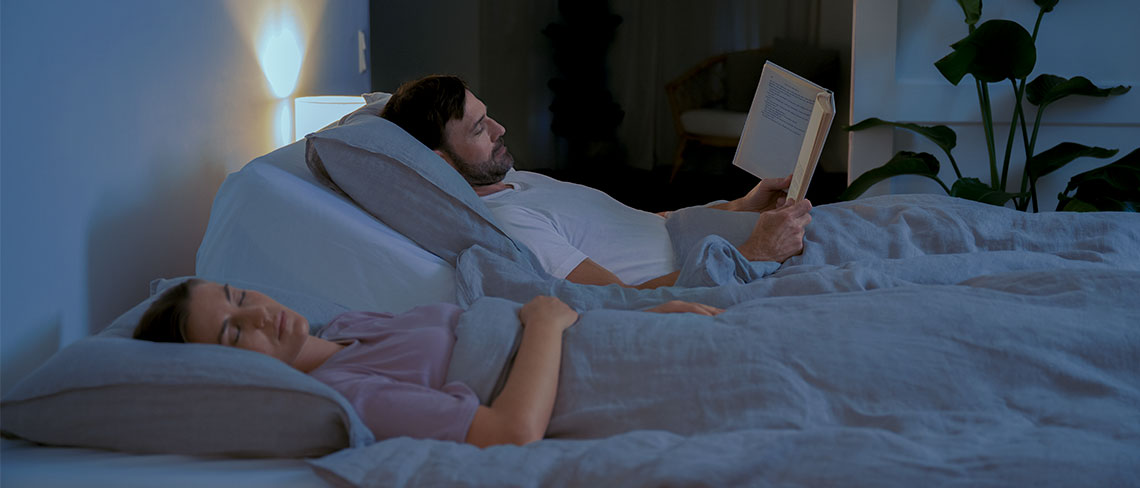
TEMPUR sleep specialist shares tips on how to shush the snoring and ensure a good night’s sleep for National Stop Snoring Week (21-27 April).
Sleep experts will all agree that the ideal sleep environment is cool, dark and quiet, so noisy rumblings in the form of snoring have no place in our sleep sanctuaries.
Snoring is sadly very common however, affecting around four in 10 people, with men more likely to snore than women. It generally occurs in middle-aged and older people as muscle tone decreases. For women, menopause can also lead to issues with snoring as hormone levels change.
Thomas Høegh Reisenhus, TEMPUR® sleep specialist & sleep counsellor says: “Snoring is a medical condition caused by a relaxation of the muscles in your throat. As the throat muscles relax, the upper airways narrow, meaning less air travelling into your lungs. The partial closing of the airways causes the walls and soft tissue of the nose, tongue, mouth and throat to vibrate – leading to the snoring sound.
“We all snore occasionally for various reasons, and although this is not usually related to any serious health problems, it can be a nuisance. However, at its most serious, ongoing poor-quality sleep caused by snoring can affect a person’s physical and mental health.
“Continual tiredness leads to headaches or a lack of concentration, making it harder to function during the day. It can also lead to irritability, change of mood and other health issues – not to mention major relationship issues if a partner is continually kept awake.
“A number of lifestyle changes can make snoring an easily treatable condition, leading to a much better night’s sleep for both snorers and their partners.”
Read on for Thomas’s tips on how to address snoring to achieve better sleep…
Sleep position
Sleeping on your back increases the likelihood of snoring as your tongue will naturally rest back into the throat, restricting airways. To prevent back-sleeping, try lying on your side and tucking a hard tennis-ball sized object behind your back, if you roll in the night the object should stop you from settling to sleep on your back.
Ditch the toxins
Smoking irritates the nostrils and throat lining, causing inflammation and a build of catarrh. This reduces air flow, making snoring more likely. Similarly, regularly drinking alcohol, or drinking too much, causes the muscles to relax more than usual, making your palate and tongue more likely to vibrate. Reducing the amount you smoke and drink, or stopping both completely, can greatly reduce snoring.
Weigh in
Being overweight, particularly around the neck, can put pressure on airways and restrict the amount of air inhaled and exhaled. Losing weight can improve your sleep as well as your overall health. Incorporating regular exercise into your daily routine can help address weight issues; try a morning yoga routine, a simple brisk walk at lunchtime or a quick jog before dinner to get moving, feel better and snore less.
Cold calling
Enlarged tonsils, a deviated septum, a common cold, or allergies can all exacerbate snoring, as the airways become inflamed or narrowed. Most infectious illnesses and common allergies can be treated with over-the-counter medication. Try to avoid sleeping pills and sedation medicines as these tend to relax muscles and can further aggravate snoring. Those that suffer from sleep apnoea – a complete closing of the airways during sleep – or from other conditions that cause extreme snoring should seek advice from a GP.
Fuel for sleep
Snorers should avoid large meals or consuming a lot of dairy before bed, as this can make snoring worse. Ideally food should be consumed 1-2 hours prior to sleep for the best possible night’s sleep.
There are a number of foods that promote good sleep too. During the afternoon and early evening, opt for snacks of cherries, blueberries and blackberries, which are sweet, anti-inflammatory fruits with the added benefit of containing naturally occurring melatonin and magnesium, both of which promote relaxation and sleep.
Extra help
There are a number of sleep aids and gadgets designed to help snorers get a better night’s sleep. A chin strap or Snore Stopper mouthpiece can help to reduce snoring, whilst for partners, it’s advisable to wear earplugs to lessen disturbance in the night.
If you’re looking for a solution that will help combat snoring as you sleep and night after night, try a smart bed base with Snore Response technology. The TEMPUR Ergo™ Smart Base features integrated Sleeptracker-AI® sensors, which detect micro-vibrations generated by snoring without the need for microphones, and in response, gently raises the sleeper’s upper body by 12 degrees – a position which can help reduce likelihood of snoring.
For more information about TEMPUR®, visit www.tempur.co.uk
-Ends-
For further press information, please contact:
Tilly Everard | Anna Nyman | Elsa Findlay | Julie Aguilera
Rooster.
T: +44 (0)203 440 8930
E: [email protected]
About TEMPUR®
TEMPUR® researches, develops, manufactures and distributes mattresses, pillows and other sleep products to improve the sleep experience worldwide.
TEMPUR® Material is the original pressure relieving mattress product made up of viscoelastic – billions of ultra-sensitive open cells that exist between a solid and a liquid state. TEMPUR® products provide the ultimate comfort and support, helping you to get a great night’s sleep night after night.
Each TEMPUR® mattress undergoes sixty-seven different quality checks, ensuring superior quality and durability.
TEMPUR® products can be purchased direct via the TEMPUR® UK website, Dreams, John Lewis, Bensons for Beds, and Furniture Village or from leading independent retailers or from any of 11 TEMPUR® brand and outlets stores.
TEMPUR® is a subsidiary of TEMPUR® Sealy International Inc. www.tempur.co.uk
Follow TEMPUR® on X, Facebook, Instagram and YouTube.






